 Credit: Assassin's Creed Valhalla
Credit: Assassin's Creed Valhalla
We fight for ruins. East Anglia is a world of mud and collapse, of bleak forests and treacherous fens. It is empty. It is quiet. Quiet except for the sound of iron against iron, the splintering of wooden gates giving way, and everywhere the screams and the yelling. A raid, Vikings stealing ashore to ransack a village and kill everyone that gets in their way. And when all the screaming and yelling is over? The ravens.
The ravens are the only real winners in East Anglia.
A tale of Midgard
Earlier this week I spent three hours with Assassin’s Creed Valhalla. I’ll say this up front: I’m very curious how people receive it, come release day.
For quite a while now, Assassin’s Creed has followed a “tick tock” development style, to borrow a phrase from Intel. One year, the tick, the experimental and boundary-pushing Assassin’s Creed. The next year, the tock, the refinement of those ideas.
The pattern’s held for this entire console generation, really. Unity was the tick, the first Assassin’s Creed built from the ground up for Xbox One and PlayStation 4, with a stunning (albeit buggy) recreation of Paris during the French Revolution. Syndicate was the tock, with a livelier London and more player agency. The next tick was Origins, using The Witcher 3 as the template for the most ambitious pivot in the series. Odyssey built on those ideas, with a sprawling map and the addition of dialogue trees.
That makes Valhalla the next tick.
And it is, I think, but the reasons aren’t immediately obvious. Valhalla is very much in the vein of Origins and Odyssey. Ubisoft’s recreated an enormous swathe of Medieval England for exploration, and many of the more mechanical changes feel like simple game-to-game refinements.
Assassin's Creed Valhalla is a bit less obvious in its Witcher 3 inspirations, for instance, ditching the ever-present “?” map icon. Undiscovered locations are now represented by three color-coded dots: Yellow for “Wealth,” white for “Secrets,” and blue for “Mysteries.”
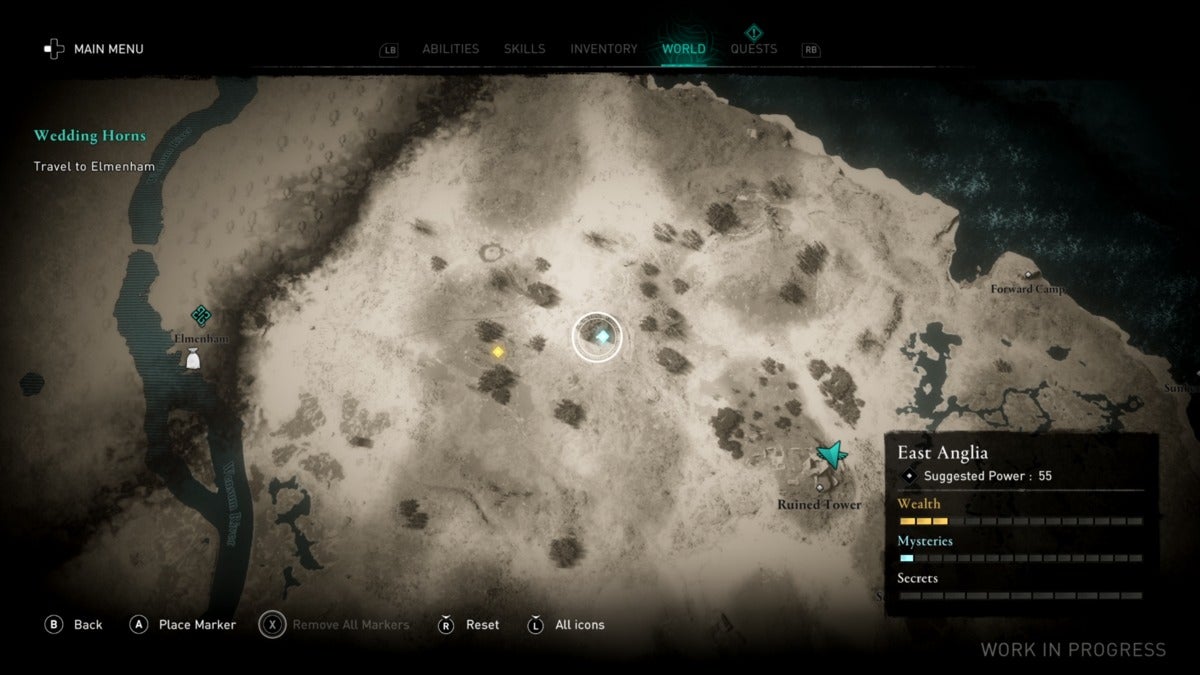 IDG / Hayden Dingman
IDG / Hayden DingmanIt’s an inspired change. The need to have an icon for each activity in Origins and Odyssey I think necessarily limited the range of experiences provided. They needed to fit tidy archetypes, like “Fort” or “Battle” or “Ruin.” But Valhalla only hints at what you might expect.
“Mysteries,” for instance, encompass everything from side quests to boss battles to bits of local color. “Wealth” is more straightforward, usually requiring you open a chest—but where and to what end, that you won’t discover until you’ve arrived. Enemy camp? Crumbling tower? There’s an ambiguity to these categories, which doubtless allows Ubisoft more freedom when devising encounters, and also makes exploration feel less artificial. It’s not quite Breath of the Wild levels of naturalistic, but it’s closer.
Rewards for exploration are also more meaningful this time, thanks to a change in the skill system. You now learn new active abilities—the ones you trigger in combat, like Odyssey’s “This is Sparta!” kick—from books hidden throughout the world. The first book you find grants the skill, and repeat books with that same skill improve its effects.
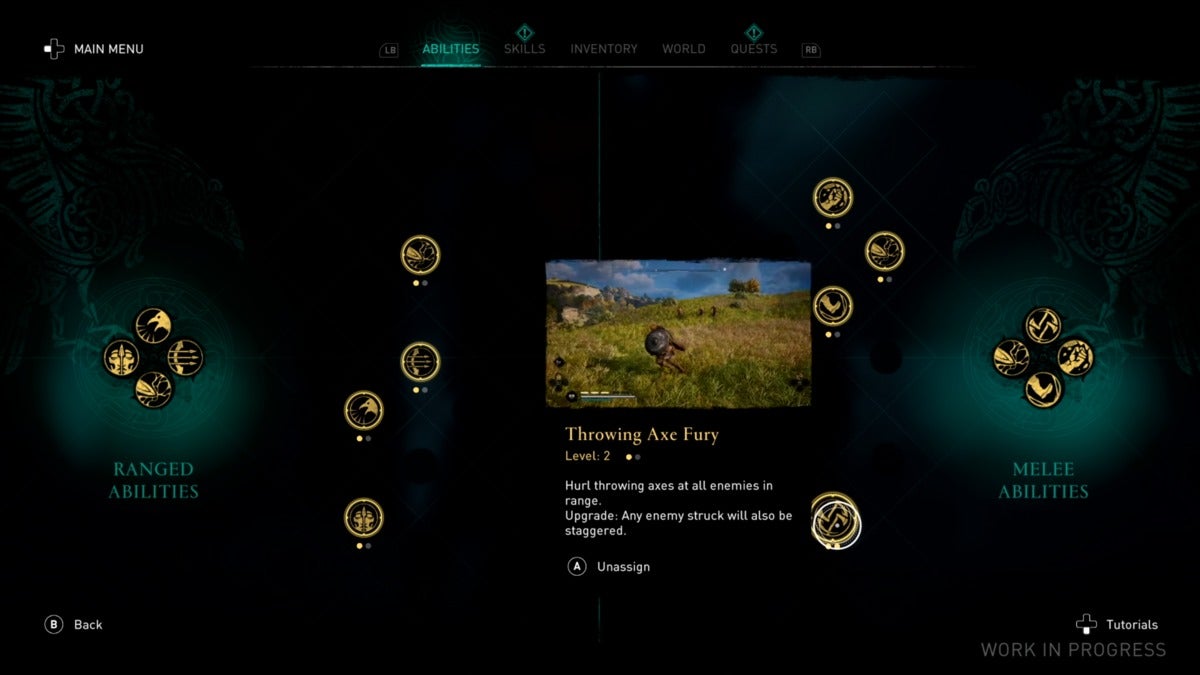 IDG / Hayden Dingman
IDG / Hayden DingmanWhy is this so smart? Well, you can only map eight skills to hotkeys at a time—four melee, four ranged. Unfortunately in Odyssey you unlocked active abilities with the same skill points as passive ones. Thus it made more sense to unlock the eight you wanted, and then dump the rest of your points on passive abilities that were always in effect. By moving active abilities outside the skill tree, it encourages players to actually experiment with all (or at least more) of them, adapting loadouts to encounters.
Assassin's Creed Valhalla overhauls the passive skill tree as well, and the inspiration appears to be...Path of Exile? Or maybe Yakuza. Either way, skills are now arrayed in long chains, with larger bonuses (like the ability to stomp on a downed enemy for critical damage) interspersed by a half-dozen smaller bumps to overall health, melee damage, stealth damage, and so on.
And while skills are still broken up generally into Melee, Ranged, and Stealth categories, the majority of the tree is hidden at the outset. New skills are only revealed as you drill down the tree, which should entice people to invest points where they otherwise might not, in hopes there’s a game-changing skill waiting at the end of a branch.
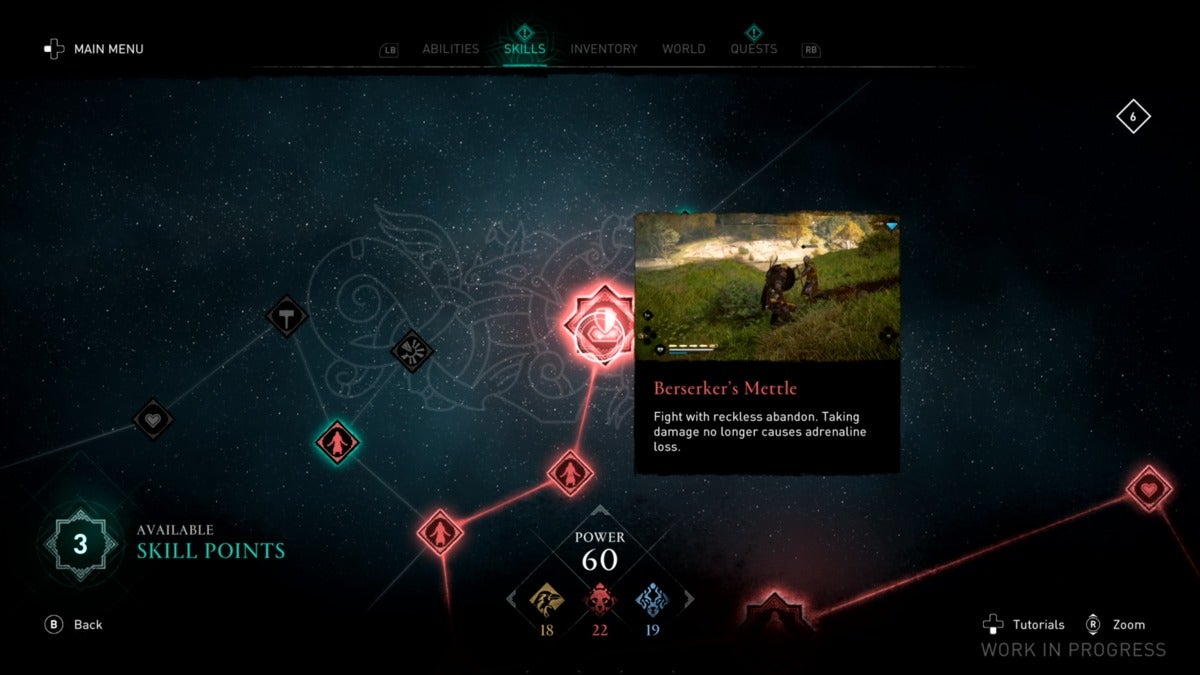 IDG / Hayden Dingman
IDG / Hayden DingmanMy only complaint is legibility. I love plotting out builds on an overcomplicated skill tree, but when it comes to actually spending points in Valhalla, panning around the tree one node at a time trying to find your next move is a bit unwieldy.
Lastly, Assassin's Creed Valhalla is the latest game to abandon recharging health bars. Is this...the end? Are healthkits back in fashion? In Valhalla they’re called “Rations,” and you can either find them on enemies or hunt for food to refill your stocks. It’s a bit tedious, grabbing raspberries and hunting rabbits in between battles, but it reminded me that in the Assassin’s Creed II era Ezio used to buy “Medicine” for the same purpose. Everything old is new again.
Anyway, these are all relatively minor changes, even in aggregate. Map presentation, skill trees, healthkits—refinements to Origins and Odyssey you might say. So why do I feel like Valhalla is quietly revolutionary, the next “tick” in this “tick tock” cycle?
It’s the tone, actually.
Since Assassin’s Creed II, the series has sported the same tone. It’s Forrest Gumpian, almost. Inspired by history, yes, and awful events occasionally take place—but they never feel like they have much weight. It’s hard to pinpoint why, but I always feel one step removed from the characters and their conflicts.
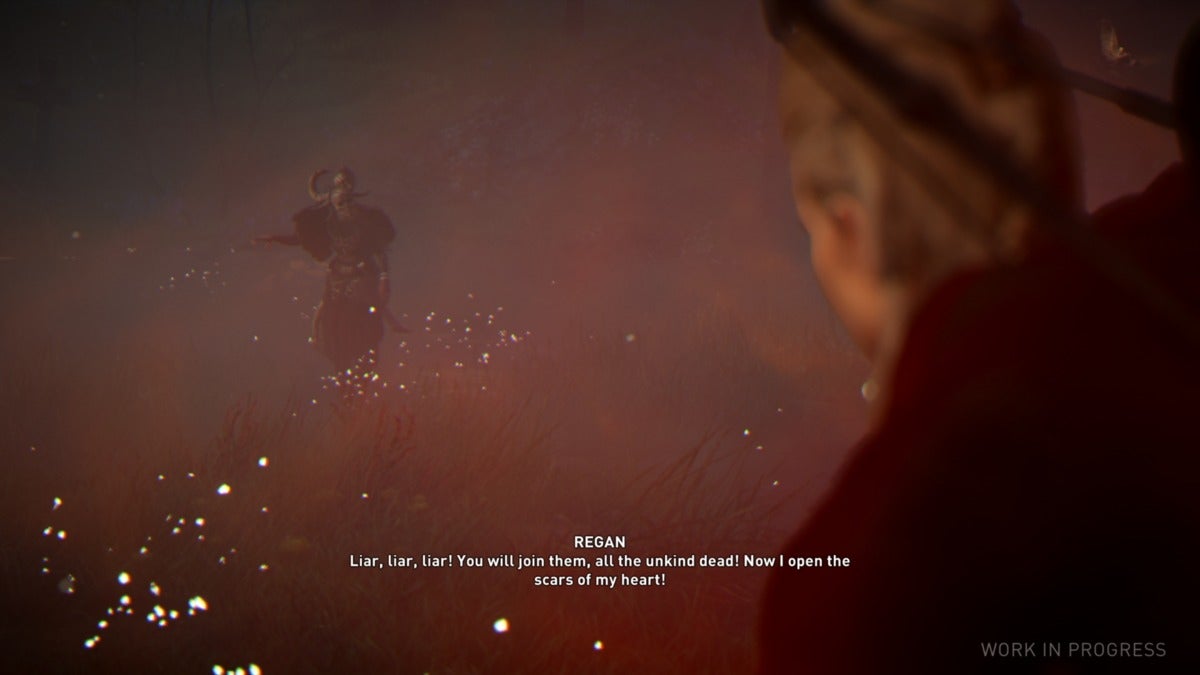 IDG / Hayden Dingman
IDG / Hayden DingmanValhalla feels different though, at least from what I played. Maybe it’s the predominance of fog and mud, the muted lighting. Maybe it’s that player-character Eivor seems dour and resolute in her quest. Maybe it’s as simple as the use of more serifed typefaces. Never underestimate the impact of a user interface.
Whatever the case, I came away thinking that Valhalla felt different from Origins and Odyssey. Substantially so. And I hate to make the comparison because it’s loaded among fans of the series, but Valhalla felt most reminiscent of Assassin’s Creed III. Widely derided at the time, it’s the closest (apart from maybe the first Assassin’s Creed) the series ever came to the self-serious tone on display in Valhalla’s early hours.
That’s not to say Valhalla will repeat the same sins as Assassin’s Creed III, or meet with the same reaction. I hope it doesn’t—and besides, I don’t even know how accurate my impression is overall. Maybe Eivor is actually more like Kassandra and Alexios than first impressions let on. I only played maybe four main story missions total, so it’s not like I have the firmest grasp on her character.
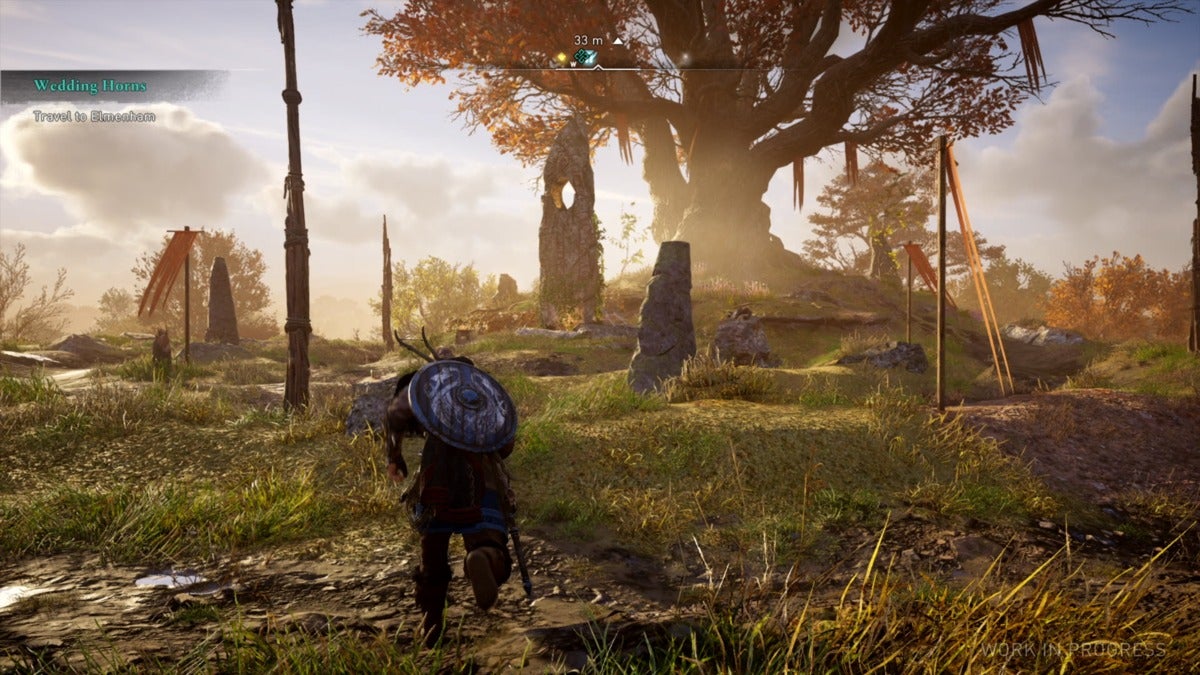 IDG / Hayden Dingman
IDG / Hayden DingmanIf Valhalla is as solemn as it seems though, that will be as big a break with tradition as Origins. It’s been a long time since Assassin’s Creed dared to write a protagonist that wasn’t just “Era-Appropriate Ezio,” and since it treated its setting with real weight and not as mere historical playground.
Bottom line
As I said, I’ll be curious how people react to Valhalla. Hell, I don’t even know how I’ll react. So far, I feel fairly positive about all of Valhalla’s changes. But as these games have grown longer, more and more pressure’s been put on the story to sustain interest. A more self-serious Assassin’s Creed could be exactly what’s needed—or it could be a disaster, like Assassin’s Creed III. It’s hard to know after only three hours, given I put upwards of 100 into Odyssey.
At least Ubisoft keeps trying though. Assassin’s Creed is one of the only series that continually reinvents itself, which is doubly impressive given its near-annual release schedule. And hey, if it doesn’t work out they can always pull a Unity and go the “back to basics” route for the next generation of consoles. Start the whole cycle all over again.
















